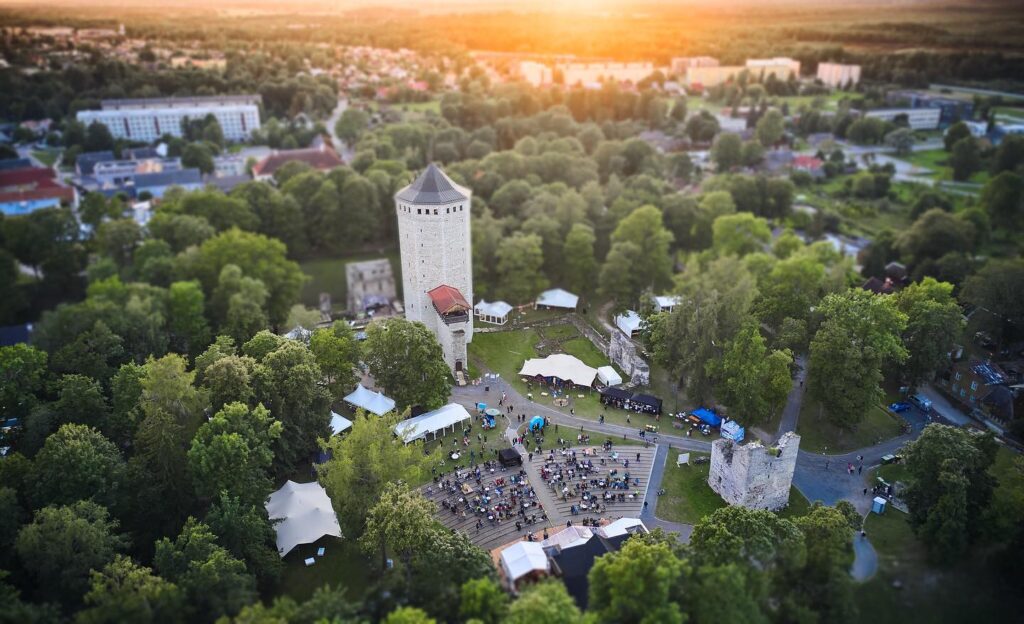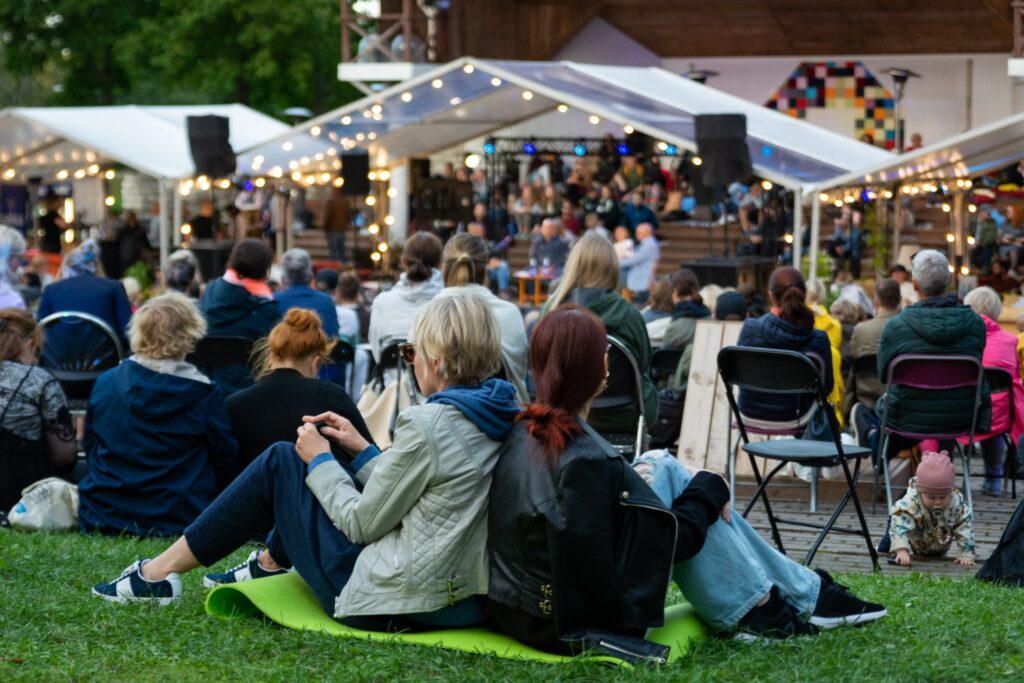The tenth Estonian Opinion Festival, a free open-air event in the town of Paide, is due to take place from 12 to 13 August and will feature 11 discussions that are held in English; Estonian World highlights all of them.
The Opinion Festival revolves around the old ruins of the Paide Castle and features mainly panel discussions, where four or five invited experts and Estonian opinion leaders debate various topics. The discussions are moderated and usually, questions from the audience are also taken.
The first Estonian Opinion Festival was organised in 2013. Since then, it has taken place annually – always in Paide – and usually attracts approximately 10,000 people, from opinion leaders to ordinary citizens.

This year, almost 150 discussions in total are scheduled to take place at the festival, the organisers said.
“This year’s programme is extremely diverse and reflects what is important in society at the moment: we are talking about war and the preparedness of the population for crises, future technology and the metaverse, raising happy children and the mental health of young people, the climate crisis and the green transition,” the head of the festival’s programme, Kaspar Tammist, said in a statement.
In addition to the panel discussions, there will be some entertainment – NOËP, an Estonian dance artist, will be DJing and the festival will conclude with a concert on Saturday night.
This year’s festival includes eleven English-language discussions:
Friday, 12 August
12 pm: Fotografiska Talks: Ancient knowledge and digital world (Digital Intelligence stage; area number 13)
Fotografiska Talks public recording, followed by a free discussion with the audience.
2 pm: Navigating next-gen technologies for culture (Digital Intelligence stage; area number 13)
“During 25 years in the mainstream internet, some technologies have triumphed while others rot. Some promised togetherness and understanding but did the opposite. We cannot ignore the fact that a new revolution is taking place – Web3, IoT, Metaverse, VR, AR, XR etc. What should we focus on in the cultural space? Let’s question the intentions and probe the consequences of the cultural transformation,” the organisers said in a brief about the discussion.
4 pm: Are migration crises the new normal in Europe? (Migration stage; area number 14)
The discussion asks: Are migration crises becoming the permanent state of affairs in Europe? What have we learned from the Syrian migration crisis and how well have been able to help Ukrainian refugees? Are we prepared for future crises?
6 pm: When the Baltic Sea becomes a NATO lake (Foreign Policy stage; area number 19)
Russia’s invasion of Ukraine triggered major changes in security of the Baltic Sea region. With Finland and Sweden on their way to join NATO, all the Baltic Sea countries apart from Russia are about to become part of the same collective defence arrangement for the first time in history.
The discussion asks: What are the implications of this change for the Baltic states, the Baltic Sea region and NATO? What kind of NATO members will Finland and Sweden be; what will be their contribution to collective defence? What new opportunities will emerge for Nordic-Baltic defence cooperation?
6 pm: Technology – always a 35-year-old white man´s world (Digital Intelligence stage; area number 13)
“ICT sector is one of the fastest growing. We need to hire more and more people to tech. But – we need to bring in more diverse people. How can we open up for different perspectives and backgrounds to be more creative, accessible and inclusive in creating digital solutions. We are not touching only the gender inequality problem but also ethnicity and other perspectives of diversity in tech,” the organisers of the discussion said.
Saturday, 13 August
10 am: Disinformation – respond, rebut, ignore? (Foreign Policy stage; area number 19)
Disinformation needs no introduction, with the war in Ukraine having offered fertile ground for it to spread faster and further than ever before. But what do we do with it? Should we always rebut or respond with our own messaging, joining the race for influence and audience share? Should we ignore it, and allow people to make up their own minds about the reliability of a source? Disinformation experts from Estonia, Latvia, Lithuania and the UK will discuss various disinformation narratives in the regional information space, and different approaches to deal with disinformation.
10 am: How does Ukraine maintain internet during the war? (War and Peace stage; area number 16)
The discussion asks: What are the weakest links in connectivity during crises? What technical, logistical or defence-related solutions are used to keep connections operational? How to withstand cyber-attacks? What can Estonia learn from this?
12 pm: Moving towards a more inclusive society (War and Peace stage; area number 16)
“Following the war in Ukraine, we need to consider obstacles and solutions in the inclusion of Ukrainian refugees, as well as how to prevent recent developments from leading to discrimination against other minorities in Estonia. We will cover issues such as access to and inclusion in the labour market and universities, measures for a more inclusive and tolerant society and linguistic inclusion,” the organisers said.
12 pm: Sharing is Caring: Neighbours for Ukraine (The Festival Club; area number 12)
Civil society forms a vital part of European community and one of its pillars, solidarity. NGOs and civil society activists from Poland, Slovakia, Romania, Bulgaria and Estonia share their experiences and good practises on how to help Ukrainian refugees with a complex range of problems. The political and socio-economical context of the receiving countries needs also to be assessed. The discussion is supported by the Active Citizens Fund.
2 pm: Looking for a Common Good – But How to Agree on What’s Good? (Open Society stage; area number 2)
Be it politics, environmental issues or health – the public discussion has been heated. Civil society organisations in democracies tend to side on the liberal spectrum. However, the role of civil society organisations is to contribute to the increase of social cohesion. A discussion between Estonian and Norwegian NGOs looks how civil society operates in countries with different history and cultural background.
4 pm: Leaving big cities: temporary or permanent? (Community stage; area number 15)
Will the home offices of the pandemic years lead to a new trend as people prefer to live and work in their country homes or smaller towns instead of big cities? Currently many have to decide on where they want to live in the long run. Employers and employees are also making new agreements about the new normalcy. The same questions are on the table both in Estonia as well as in the Nordic countries.

